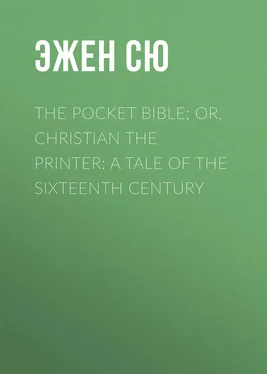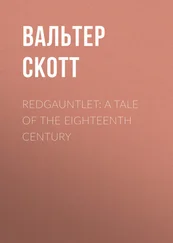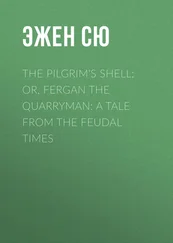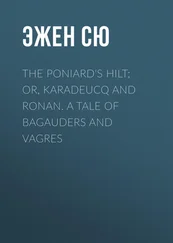Эжен Сю - The Pocket Bible; or, Christian the Printer - A Tale of the Sixteenth Century
Здесь есть возможность читать онлайн «Эжен Сю - The Pocket Bible; or, Christian the Printer - A Tale of the Sixteenth Century» — ознакомительный отрывок электронной книги совершенно бесплатно, а после прочтения отрывка купить полную версию. В некоторых случаях можно слушать аудио, скачать через торрент в формате fb2 и присутствует краткое содержание. Жанр: literature_19, foreign_antique, foreign_prose, на английском языке. Описание произведения, (предисловие) а так же отзывы посетителей доступны на портале библиотеки ЛибКат.
- Название:The Pocket Bible; or, Christian the Printer: A Tale of the Sixteenth Century
- Автор:
- Жанр:
- Год:неизвестен
- ISBN:нет данных
- Рейтинг книги:3 / 5. Голосов: 1
-
Избранное:Добавить в избранное
- Отзывы:
-
Ваша оценка:
- 60
- 1
- 2
- 3
- 4
- 5
The Pocket Bible; or, Christian the Printer: A Tale of the Sixteenth Century: краткое содержание, описание и аннотация
Предлагаем к чтению аннотацию, описание, краткое содержание или предисловие (зависит от того, что написал сам автор книги «The Pocket Bible; or, Christian the Printer: A Tale of the Sixteenth Century»). Если вы не нашли необходимую информацию о книге — напишите в комментариях, мы постараемся отыскать её.
The Pocket Bible; or, Christian the Printer: A Tale of the Sixteenth Century — читать онлайн ознакомительный отрывок
Ниже представлен текст книги, разбитый по страницам. Система сохранения места последней прочитанной страницы, позволяет с удобством читать онлайн бесплатно книгу «The Pocket Bible; or, Christian the Printer: A Tale of the Sixteenth Century», без необходимости каждый раз заново искать на чём Вы остановились. Поставьте закладку, и сможете в любой момент перейти на страницу, на которой закончили чтение.
Интервал:
Закладка:
Gloomy and pensive the artisan listened to his wife without interrupting her. He replied:
"No, dear wife; fanaticism is no safeguard against evil. Alas! differently from you, the more I consider the facts that you adduce – I hardly dare say so to you – my suspicions, so far from being removed, grow in weight. Yes, I believe our son guilty."
"Great God! What a horrible thought!"
"I believe our son is sincere in his devout practices, however exaggerated these may be. But I also know that one of the most frightful consequences of fanaticism is that it clouds and perverts the most elemental principles of right and wrong, of justice and injustice, with those whom it dominates. Religious faith substitutes morality."
"But theft, seeing that I must mention the word – theft – how can fanaticism excuse that? You must be mistaken upon that subject!"
"Listen, Bridget. A few days ago – and it was the recollection of the circumstance that first awoke my suspicions – a few days ago one of our fellow workmen at the shop expressed himself with indignation at the traffic of indulgences that has recently been carried on in Paris, and he said emphatically that besides the immorality of the trade that was being practiced in the Pope's name, the extortion of money by such means from ignorance and from popular credulity was nothing short of a fraud practiced upon the people. And do you know the answer that our son made? 'That is a lie! It is impious! The money that is devoted to a pious deed, even if it be the fruit of a theft, of a murder, is purified and sanctified from the moment that it is employed to the greater glory of the Lord!'"
Bridget grew pale, and murmured in a voice smothered by sobs:
"Oh! now I fear – I also fear! May God have mercy upon us!"
"Do you now understand how, if our son is indeed guilty of the shameful act which we hesitate to impugn to him, in his blind fanaticism the unhappy boy will have believed that he was doing a meritorious act if he employed the money in some such work of devotion as ordering the saying of masses?"
CHAPTER II.
THE NEOPHYTE
As Christian was saying these words, he heard, first at a distance and soon after on the Exchange Bridge itself, the loud clang of several bells and the sharp twirl of metal rattles, intercepted with a lugubrious psalmody, at the close of which the noise of bells and rattles became deafening. No less astonished than his wife, the artisan rose from his seat, opened the window, and saw a long procession filing before the house. At its head marched a detachment of archers carrying their cross-bows on their left shoulders and long thick wax candles in their right hands; behind them came several Dominican monks in their white robes and black cowls, ringing the bells and turning the rattles; after these followed a cart drawn by two horses caparisoned in black and silver network. The four sides of the cart were of considerable height and constituted a huge quadrangular transparency, lighted from within, and representing the figures of men and women of all ages, together with children, plunged up to the waist in a sea of flames, and, amid desperate contortions, raising their suppliant arms towards an image of God seated on a throne. On each of the four sides of the wagon and above the painting the following inscription was to be seen, printed in thick black and red letters:
Four monks equipped with long gilded staves, topped with glass lanthorns, on which also souls in torture were painted, marched on either side of the cart. A large number of other Dominican monks carrying a large silver crucifix at their head, followed the cart. The monks chanted in a loud voice the following lugubrious psalm of penitence:
"De profundis clamavi ad te, Domine;
Domine, exaudi vocem meam.
Fiant aures tuæ intendentes
In vocem deprecationis meæ!" 4 4 From the bowels of the earth I have cried up to thee, O, Lord; O, Lord, give ear unto my voice. May thy ears be ready to listen To the voice of my supplications.
Every time, at the close of the funereal chant, the clatter of bells and rattles was struck up anew as the procession marched along. Finally, a second detachment of archers brought up the rear. A crowd of ragged men and women, all with cynic and even ruffianly faces, almost all night-strollers, if not worse, followed in the wake of the march. They held one another by the arms, sang, crossed themselves and shouted:
"Glory to the Holy Father!"
"He sends us indulgences!"
"We need them!"
"Blessings upon him!"
Interspersed between these exclamations, coarse and even obscene jokes were exchanged. The mob nevertheless bore the impress of conviction in the most deplorable of superstitions. A large number of the inhabitants of the houses built upon the bridge threw open their windows as the procession filed by; some of these reverently knelt down at their windows. After the procession had passed and the noise sounded only from a distance, Christian re-shut the window of his room, and said to his wife in voice that was even sadder than before:
"Alas, this procession seems to me to bode us only ill."
"I do not understand you, my friend."
"You saw, Bridget, the picture on the transparency of the cart that these monks surrounded. It represented the souls in purgatory, writhing in flames. The Dominican monks, whom the Pope has delegated to sell plenary indulgences, also sell the ransoming of souls in pain. All those who share that belief are convinced that, by means of money, they are able to snatch from the flames of purgatory, not only the near relatives or friends whom they imagine exposed to such torture, but also strangers to them. Could not Hervé have thought to himself: 'With the gold that I purloin from my father I shall be able to ransom twenty souls – fifty souls from purgatory'?"
"Say no more, Christian, say no more!" cried Bridget with a shudder; "say no more! My doubts, alas! almost turn into certainty;" but suddenly interrupting herself and listening in the direction of the door of the room, she added in a low voice: "Listen – listen."
Husband and wife remained silent. In the midst of the profound silence of the night they heard a noise that sounded like the intermittent strapping of a body. A thought flashed through Christian's mind; he motioned his wife not to stir; took up the lamp, and gently opened the door leading to the wooden staircase through which the lower floor was reached. Leaning over the banister with his hand shading the lamp, Christian saw Hervé, whom, no doubt, the clatter of bells and rattles of the procession had awakened, kneeling in only his shirt and trousers upon the floor and inflicting a rude discipline upon his sides and shoulders by means of a cat-o'-nine-tails, the thongs of which ended in knots. The lad flagellated himself with such intense exaltation that he did not notice the proximity of his father on the staircase, although the light shed by the lamp projected its rays into the lower hall. Bridget had followed her husband with tears in her eyes, walking on tip-toe. He felt the trembling hand of his wife upon his shoulder and in his ear the whispered words of distress that forced themselves through her sobs:
"Oh, the unhappy boy!"
"Come, my dear wife; the moment is favorable to obtain a confession from our son."
Читать дальшеИнтервал:
Закладка:
Похожие книги на «The Pocket Bible; or, Christian the Printer: A Tale of the Sixteenth Century»
Представляем Вашему вниманию похожие книги на «The Pocket Bible; or, Christian the Printer: A Tale of the Sixteenth Century» списком для выбора. Мы отобрали схожую по названию и смыслу литературу в надежде предоставить читателям больше вариантов отыскать новые, интересные, ещё непрочитанные произведения.
Обсуждение, отзывы о книге «The Pocket Bible; or, Christian the Printer: A Tale of the Sixteenth Century» и просто собственные мнения читателей. Оставьте ваши комментарии, напишите, что Вы думаете о произведении, его смысле или главных героях. Укажите что конкретно понравилось, а что нет, и почему Вы так считаете.












